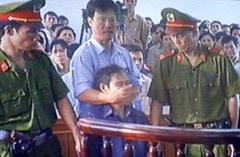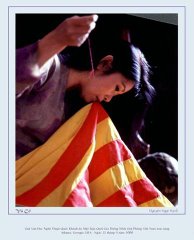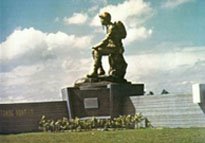When police came to Nguyen Van Dai's door on Feb. 8, the Vietnamese human rights lawyer thought he was in for an ordinary questioning session. He was certainly used to them, having been called in by police at least a dozen times for running educational seminars on democracy, which authorities said threatened national security. But this time, it was different. Dai was taken to his local People's Committee, where about 200 murmuring citizens were waiting to denounce him for his crimes against society. One by one, the audience, mostly elderly, came to the microphone to speak — sometimes heatedly. "He has spread half-truths and negative information about Vietnam," one man said accusatorily in footage that was later shown on national television. Another, according to Dai's own account, declared he could no longer control his outrage at the "traitor" and rushed toward Dai shouting, "I'm so angry, I want to choke him!" Police pulled the attacker away and handed the microphone to the next speaker.
Dai's tale sounds like a recollection from the old Vietnam, back when the Communist Party ruled nearly every aspect of citizens' lives and public denunciations were used routinely to keep dissenters in line. About a dozen dissidents have been arrested or exiled in what human rights grups call Vietnam's harshest political crackdown in 20 years. Of these, at least four have endured public humiliation ceremonies. "They want to frighten us," Dai explains. "They use the people and our neighbors to try to shame us, so they don't have to use the courts." Not that the courts are off-limits. Soon after sitting down for a mid-February interview with TIME to describe his denunciation session, Dai was arrested; on May 11, after a one-day trial, he was sentenced to five years in prison for "spreading propaganda against the Socialist Republic."
Whereas in the past couple of decades Vietnam's government would often conduct the trials of its opponents relatively low-key, the latest wave of denunciations and arrests have been anything but. Indeed, they seem to have been stepped up in response to a resurgent pro-democracy movement and, for the first time, publicized in state media. Foreign and local journalists have been allowed to attend the open trials, while the state-controlled media has run lengthy screeds against the defendants. The shift in strategy is in some ways a reflection of a changing Vietnam. Nearly 60% of the population of 85 million is under 30 years old; they are increasingly Internet-literate, eager to join the global community and able to access news and information from the outside world. There's no point in downplaying a political crackdown because people will find out about it anyway, according to Martin Gainsborough, a political scientist and Vietnam expert at the University of Bristol in the U.K. Instead, the government is trying "to continually remind the public that these people are beyond the pale," Gainsborough says. "They need to keep the dissidents and the majority of citizens apart." The overall message: that activists are criminals, not dissidents — and that they are threatening Vietnam's stability.
At the same time, however, officials are working hard to convince ordinary Vietnamese that their system is actually becoming more open and democratic. Hanoi may soon announce the results of its May 20 National Assembly elections, touted as a democratic exercise because the government actively encouraged pre-screened "self-nominated" candidates to run. In February, Prime Minister Nguyen Tan Dung held an unprecedented online chat with ordinary citizens, in which he frankly answered questions on the economy and press censorship. Meanwhile, state media have published lengthy articles criticizing multi-party "Western-style" democracy as messy and debilitating, while trumpeting the "Vietnamese style" of one-party rule as a guarantor of wealth and peace. "They're saying, 'This is how we do democracy, and it's a really good process... and it's something to be proud of,'" says Gainsborough. Dai, who told TIME before his arrest that he found many members of Vietnam's younger generation hungry for democratic change, would disagree. He pointed out that most of the accusers at his denouncement ceremony were over 60, many of them veterans of what's known here as the American War. "The reason [authorities] didn't invite young people is, they fear they would have laughed at the process," he said.
But while the crackdown on dissidents has been condemned internationally, there's been little public outrage at home. Right now, life has never looked better for most Vietnamese: the economy has grown by more than 7% a year over the past decade, second in Asia only to China's, and this year's entry into the World Trade Organization has touched off a flood of foreign investment. A 2006 Gallup International survey called Vietnam the world's most optimistic country for the fourth year in a row, with 94% of urban residents predicting life would improve in 2007. As long as the government keeps delivering healthy economic growth, says Carl Thayer, a political scientist at Australia's National Defence Academy who has studied the country for more than 30 years, "there's not going to be a revolt from below in Vietnam." Nevertheless, while Vietnamese can make money, cast ballots and even chat with the prime minister online, questioning the Communist Party's hold on power can still mean being sent to prison. And anyone who does so may first face a roomful of angry denouncers first.
Freedom of Speech Under Communism

Favorite Videos
We Will NEVER Forget.....

Favorite Links
Gone...but not forgotten.



Why this Blog?
There are 2 main reasons for this site:
1) There are many young Vietnamese who care about issues concerning Vietnam and the Vietnamese Diaspora, but cannot, or are not very proficient, at reading Vietnamese. Therefore, this site compiles and disseminates these news in English, so that the new generation of Vietnamese around the world can become more aware and, thus, closer to issues in the homeland.
2) Young Vietnamese have many ideas, many differing views on the prospects to democratize and develop Vietnam. The argument for peaceful development verses demands for justice and human rights. Which comes first? Can a civil, peaceful society be built without foundations of social justice?
These are the issues YOU can debate on this site. But remember, say what you mean, and mean what you say, but don't be mean when you say it.
1) There are many young Vietnamese who care about issues concerning Vietnam and the Vietnamese Diaspora, but cannot, or are not very proficient, at reading Vietnamese. Therefore, this site compiles and disseminates these news in English, so that the new generation of Vietnamese around the world can become more aware and, thus, closer to issues in the homeland.
2) Young Vietnamese have many ideas, many differing views on the prospects to democratize and develop Vietnam. The argument for peaceful development verses demands for justice and human rights. Which comes first? Can a civil, peaceful society be built without foundations of social justice?
These are the issues YOU can debate on this site. But remember, say what you mean, and mean what you say, but don't be mean when you say it.
Blog Archive
-
▼
2007
(106)
-
▼
June
(13)
- Vietnamese American Youth Response to Viet Nam Pre...
- U.S. lawmakers slam Vietnam president on human rights
- Bush: Vietnam Must Commit To Human Rights To Boost...
- Second-Rate Welcome For Vietnam's Prez
- Vietnamese President to Visit Amid Human Rights Cr...
- SANCHEZ, PELOSI MEET WITH PRO-DEMOCRACY ADVOCATES ...
- Rumored visit has Little Saigon abuzz
- Indigenous peoples of Vietnam, the Degar Montagnar...
- Vietnamese leader to get an earful of rights compl...
- Hanoi releases a third detainee on U.S. list
- Vietnam frees dissident ahead of president's US vi...
- Bush to press Vietnam on arrests of dissidents By ...
- Vietnam's War on Dissent Goes Public
-
▼
June
(13)

No comments:
Post a Comment